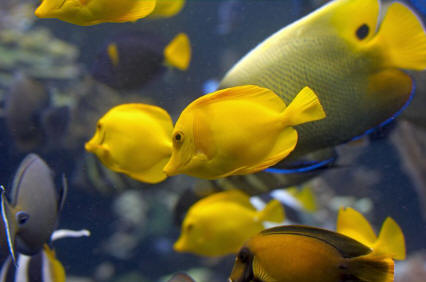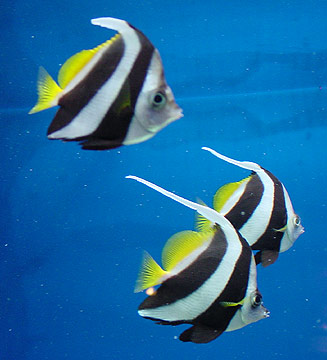Senegal Bichir

|
Scientific Name: Polypterus senegalus Price: Upon Request Origin: Africa Family: Polypteridae NOT AVAILABLE NOW |
|
Other Names: Cuvier Bichir, Gray Bichir, Dragonfin, Dinosaur Eel |
|
Technical Info
Temperature: 24 - 28 ℃
pH: 6.2 - 7.8
GH: 5 - 20
Max size: 50 cm
Min Tank size: 400 Ltr
Position in Aqua: Middle swimmer
Description
As with other members of the primitive Polypteridae family, the Senegal Bichir has the unique ability to survive out of water. With a lung-like paired swim bladder and gills to help breathing, the Senegal Bichir can spend short periods of time on land, but must soon return to its water environment for adequate respiration. This species is brown in color with an elongated snakelike body.
Food
Predatory fish. Meaty foods such as prawn and white fish will be readily accepted. Also live or frozen foods such as bloodworm and brineshrimp. P. senegalus will sometimes accept good quality cichlid pellets.
Breeding
This species breeds during the rainy season in nature and changes in the temperature and chemistry of the water are likely to induce spawning behaviour. A large tank is required and should contain soft, slightly acidic water. It is an egg scatterer and therefore areas of dense planting and/or spawning mops should be provided. Courtship involves chasing and nudging of the female by the male. During spawning itself, the male receives the eggs from the female by cupping his anal and caudal fins around her genitals. He then fertilises the eggs before scattering them amongst vegetation. At this point, the adult fish should be removed as they may predate upon the eggs. The eggs hatch in 3-4 days, with the fry becoming free swimming around 3 days later. First foods should be brine shrimp nauplii or microworm. Apparently the fry are not particularly mobile, so care should be exercised to ensure they are well fed.
Compatible with
Not to be trusted with tankmates it can fit in its mouth but is relatively peaceful otherwise. Suitable tankmates include other Polypterus species, Synodontis, Datnoides, Knife Fish, larger Ctenopoma species, medium to large characins and African Butterfly Fish.

